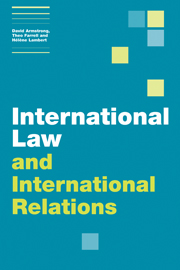9 - International law in a unipolar age
Published online by Cambridge University Press: 05 June 2012
Summary
In our introduction to this book, we asserted that international law matters more now than ever before. On the face of it, the rise of US power at the turn of the third millennium appears to challenge this assertion. The collapse of the Soviet Union in 1991 left the world with only one superpower. What was quickly recognised to be a ‘unipolar moment’ in world history has turned into a unipolar age. The concentration of economic, military and political power in the United States is so great that no rival power will rise, nor counterbalancing alliance emerge, for the foreseeable future. Indeed, it is now common to speak of US hegemony in imperial terms. Hence Joseph Nye noted in 2003: ‘the world “empire” has come out of the closet. Respected analysts on both the left and the right are beginning to refer to “American empire” approvingly as the dominant narrative of the 21st century.’ This view of the United States is shared across the world. As one Russian specialist observed, ‘whether or not the United States now views itself as an empire, for many foreigners it increasingly looks, walks and talks like one, and they respond to Washington accordingly’.
In recent years, this hegemonic United States has appeared to show scant regard for international law. It has opposed major multilateral treaties on nuclear testing, land-mines, climate change, biological diversity, law on the sea and the International Criminal Court (ICC), all of which are supported by most other states.
- Type
- Chapter
- Information
- International Law and International Relations , pp. 281 - 294Publisher: Cambridge University PressPrint publication year: 2007



